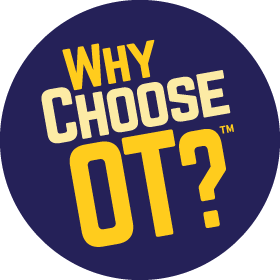What is an Occupational Therapy Assistant?
Occupational Therapy Assistants (OTAs) work under the supervision of occupational therapists (OTs) to provide vital support to individuals of all ages who are facing various challenges in their daily lives. While the OT evaluates and develops treatment plans for clients, the OTA puts those plans into action, teaching individuals how to overcome the challenges of performing daily activities brought about by an injury, illness, or disability.
What do OTAs do?
OTAs play a pivotal role in implementing therapy sessions. They work closely with OTs to help people relearn or develop new skills because of an injury, disability, or health setback.
OTAs find helpful tools, adjust surroundings, and involve families to make daily tasks easier and safer for their patients. Their goal is to help people improve and feel more confident in their everyday lives, no matter where they are.

How do OTAs help people?
OTAs work closely with OTs to develop treatment plans to help people meet their goals.
Their dedicated support enables individuals to regain independence and confidence in their daily lives, fostering progress and well-being.
Where do OTAs work?
You’ll find OTAs wherever there is a need to help individuals lead meaningful and fulfilling lives!
- Hospitals
- Rehabilitation centers
- Schools
- Nursing homes
- Mental health facilities
- Pediatric clinics
- Community health centers
- Private practice
- Workplaces
- In your home
- Education
- Correctional facilities
- Assisted living facilities
- Vocational rehabilitation programs
- Hand therapy clinics
- Assistive tech centers
- Hospice and palliative care
- And more!

Why do we need OT professionals?
So everyone can live as independently as possible with the best quality of life. OT pros:
- Help children who may have developmental delays or disabilities succeed in school and life
- Provide rehabilitation to people with illnesses, injuries, or disabilities so they can regain the ability to live meaningful lives
- Assist older adults in managing chronic conditions, adapting to age-related changes, and maintaining their independence
- Enhance daily function of individuals living with arthritis, multiple sclerosis, Parkinson’s disease, and so many other chronic conditions
- Help people address mental health challenges by developing skills and strategies to manage and improve mental well-being while addressing the impact on their daily lives
- Create safe and ergonomic work environments to reduce risk of workplace injuries and improve productivity and comfort
- Integrate people with disabilities or mental health challenges into their communities
- Recommend assistive devices and technology that can improve an individual’s ability to do their daily activities
- Advocate for the rights and needs of their individual clients by helping them access appropriate healthcare services, educational accommodations, or assistive devices.
- And so much more!
Are you curious about a career where you can make a real impact on people’s lives while having flexibility and job security?
Learn about how to become an Occupational Therapy Assistant!
